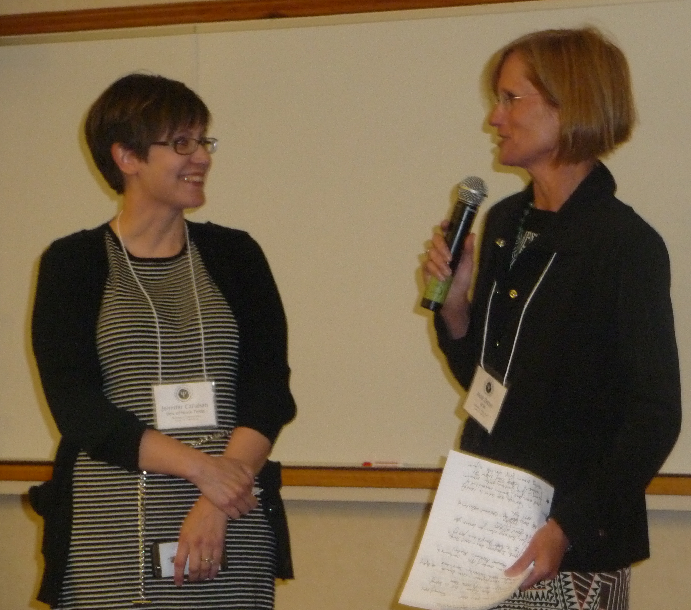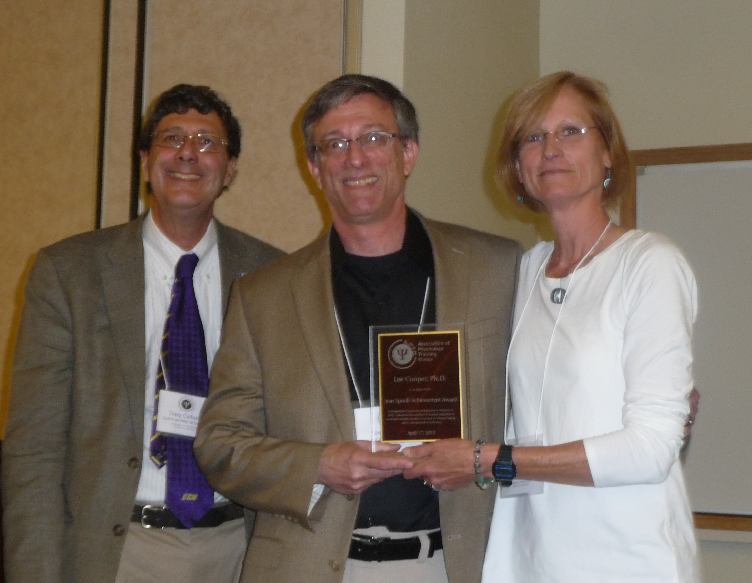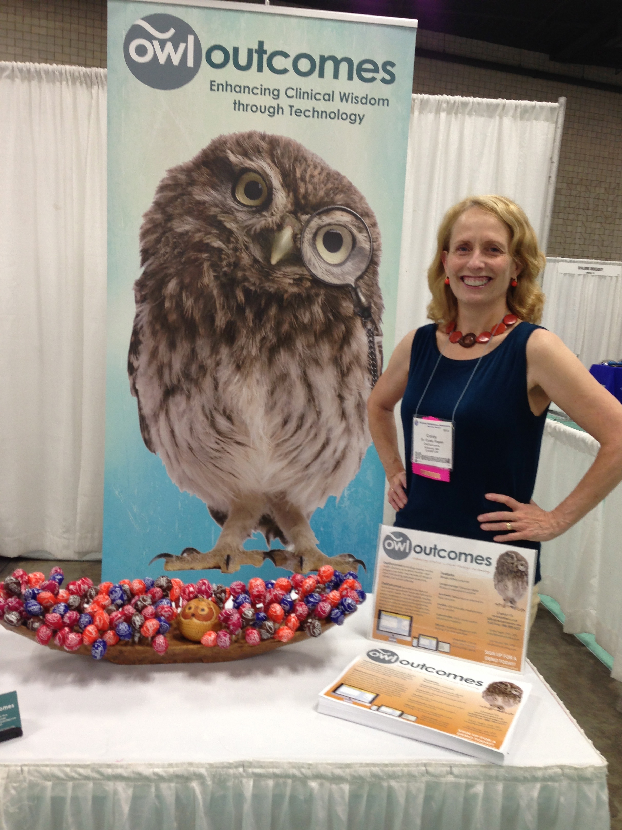APTC AWARDS
Jennifer
L. Callahan, Ph.D., ABPP
Friend of
APTC Award
In recognition
of your longstanding dedication & support for high
standards of training & practice in professional
psychology doctoral training clinics and for your
outstanding leadership in directing the inaugural
multi-site research study in APTC
 Jennifer L. Callahan
received the Friend of APTC Award for her outstanding leadership
in directing the inaugural multi-site research study in APTC.
The project led to a publication entitled, “Introducing the
Association of Psychology Training Clinic’s Collaborative
Research Network: A Study on Client Expectancies,” authored by
Callahan, Jennifer L.; Gustafson, Scott A.; Misner, Jessica B.;
Paprocki, Christine M.; Sauer, Eric M.; Saules, Karen A.,
Schwartz, Jennifer L., Swift, Joshua K., Whiteside, Douglas M.,
Wierda, Kathryn E., & Wise, Erica H., (2014) and published
in Training and Education in Professional Psychology, 8, 95-104.
Six APTC training clinics participated in the study. Without Dr.
Callahan’s strong leadership, expertise, and passion the idea of
a practice research network would have likely remained just
another good idea. She made that idea and reality and she
is truly a Friend of APTC.
Jennifer L. Callahan
received the Friend of APTC Award for her outstanding leadership
in directing the inaugural multi-site research study in APTC.
The project led to a publication entitled, “Introducing the
Association of Psychology Training Clinic’s Collaborative
Research Network: A Study on Client Expectancies,” authored by
Callahan, Jennifer L.; Gustafson, Scott A.; Misner, Jessica B.;
Paprocki, Christine M.; Sauer, Eric M.; Saules, Karen A.,
Schwartz, Jennifer L., Swift, Joshua K., Whiteside, Douglas M.,
Wierda, Kathryn E., & Wise, Erica H., (2014) and published
in Training and Education in Professional Psychology, 8, 95-104.
Six APTC training clinics participated in the study. Without Dr.
Callahan’s strong leadership, expertise, and passion the idea of
a practice research network would have likely remained just
another good idea. She made that idea and reality and she
is truly a Friend of APTC.
Lee Cooper, Ph.D.
Jean
Spruill Achievement Award
In recognition of your longstanding
active involvement in APTC, commitment to excellence
in training, dedication to innovative and best
practices in doctoral psychology training clinics, and
inspirational leadership

Lee Cooper was a founding member of APTC and was president from
2001 to 2003. He developed the association’s first strategic plan
and was instrumental in building the structure of the
organization. Dr. Cooper is a frequent presenter at APTC meetings
and a regular contributor to the newsletter. He received a Society
for the Science of Clinical Psychology Varda Shoham Clinical
Scientist Training Grant in 2014 and used the funds to launch
OwlOutcomes, a routine outcome monitoring system developed by APTC
member Corey Fagan, in the Psychological Services Center at
Virginia Tech. Dr. Cooper’s outstanding leadership, commitment,
and integrity are matched only by his humility. Thus, it is with
true delight that we honored him with the Jean Spruill Achievement
Award at our annual meeting.
University of Washington
Psychological
Services and Training Center (Corey Fagan, Ph.D.)
First Annual
Clinic Innovation Award:
OwlOutcomes
This new award was innovated by
Heidi Zetzer. It includes a $500 check for the
Director’s clinic and an invitation to present on
the innovation at the APTC awards presentation at
the Annual Meeting.
 Corey Fagan and other
collaborators developed a premier routine outcome monitoring
system, called OwlOutcomes. Corey brought OwlOutcomes into
member clinics for beta testing, including training clinics at
UCLA, UNC, Seattle Children’s Hospital Outpatient Department of
Psychiatry and Behavioral Medicine, and BU’s Center for Anxiety
and Related Disorders. The initial testing resulted in
installation of OwlOutcomes in those clinics as well as Virginia
Tech, USC, and George Washington University. OwlOutcomes
was selected for the extensive benefits to clients, graduate
students, clinic directors, and the science and practice of
professional psychology, making life easier for trainees,
supervisors, researchers, and administrators, and expected
to have a significant impact on research, training, and practice
in the field.
Corey Fagan and other
collaborators developed a premier routine outcome monitoring
system, called OwlOutcomes. Corey brought OwlOutcomes into
member clinics for beta testing, including training clinics at
UCLA, UNC, Seattle Children’s Hospital Outpatient Department of
Psychiatry and Behavioral Medicine, and BU’s Center for Anxiety
and Related Disorders. The initial testing resulted in
installation of OwlOutcomes in those clinics as well as Virginia
Tech, USC, and George Washington University. OwlOutcomes
was selected for the extensive benefits to clients, graduate
students, clinic directors, and the science and practice of
professional psychology, making life easier for trainees,
supervisors, researchers, and administrators, and expected
to have a significant impact on research, training, and practice
in the field.
From Corey Fagen:
The literature is clear that tracking patient progress using
evidence-based assessment measures improves outcomes and
optimizes treatment times. The challenge was how to implement
routine outcome tracking in our clinics in a way that wouldn’t
burden either the clients or the trainees. At the time- about 8
years ago- most measures were still paper and pencil or
proprietary, making scoring, graphing and analyzing the data
difficult. Jon Hauser, my co-founder and the IT brain
behind the OwlOutcomes software, and I dreamed of developing a
software tool that would make routine outcome monitoring easy
and automatic. We’ve spent the last 3 years beta-testing the
software and piloting version 1.0. The feedback from Seattle
Children’s Hospital and the other clinic directors has been
invaluable. We now have a tool that has both clinical utility
and potential as a research tool. We envision the day when we
have enough clinics using the Owl for routine outcome monitoring
that we can pool data and form a practice research network.
To find out more about OwlOutcomes go
to: www.owloutcomes.com
For demos go to: info@owloutcomes.com
 Jennifer L. Callahan
received the Friend of APTC Award for her outstanding leadership
in directing the inaugural multi-site research study in APTC.
The project led to a publication entitled, “Introducing the
Association of Psychology Training Clinic’s Collaborative
Research Network: A Study on Client Expectancies,” authored by
Callahan, Jennifer L.; Gustafson, Scott A.; Misner, Jessica B.;
Paprocki, Christine M.; Sauer, Eric M.; Saules, Karen A.,
Schwartz, Jennifer L., Swift, Joshua K., Whiteside, Douglas M.,
Wierda, Kathryn E., & Wise, Erica H., (2014) and published
in Training and Education in Professional Psychology, 8, 95-104.
Six APTC training clinics participated in the study. Without Dr.
Callahan’s strong leadership, expertise, and passion the idea of
a practice research network would have likely remained just
another good idea. She made that idea and reality and she
is truly a Friend of APTC.
Jennifer L. Callahan
received the Friend of APTC Award for her outstanding leadership
in directing the inaugural multi-site research study in APTC.
The project led to a publication entitled, “Introducing the
Association of Psychology Training Clinic’s Collaborative
Research Network: A Study on Client Expectancies,” authored by
Callahan, Jennifer L.; Gustafson, Scott A.; Misner, Jessica B.;
Paprocki, Christine M.; Sauer, Eric M.; Saules, Karen A.,
Schwartz, Jennifer L., Swift, Joshua K., Whiteside, Douglas M.,
Wierda, Kathryn E., & Wise, Erica H., (2014) and published
in Training and Education in Professional Psychology, 8, 95-104.
Six APTC training clinics participated in the study. Without Dr.
Callahan’s strong leadership, expertise, and passion the idea of
a practice research network would have likely remained just
another good idea. She made that idea and reality and she
is truly a Friend of APTC. 
 Corey Fagan and other
collaborators developed a premier routine outcome monitoring
system, called OwlOutcomes. Corey brought OwlOutcomes into
member clinics for beta testing, including training clinics at
UCLA, UNC, Seattle Children’s Hospital Outpatient Department of
Psychiatry and Behavioral Medicine, and BU’s Center for Anxiety
and Related Disorders. The initial testing resulted in
installation of OwlOutcomes in those clinics as well as Virginia
Tech, USC, and George Washington University. OwlOutcomes
was selected for the extensive benefits to clients, graduate
students, clinic directors, and the science and practice of
professional psychology, making life easier for trainees,
supervisors, researchers, and administrators, and expected
to have a significant impact on research, training, and practice
in the field.
Corey Fagan and other
collaborators developed a premier routine outcome monitoring
system, called OwlOutcomes. Corey brought OwlOutcomes into
member clinics for beta testing, including training clinics at
UCLA, UNC, Seattle Children’s Hospital Outpatient Department of
Psychiatry and Behavioral Medicine, and BU’s Center for Anxiety
and Related Disorders. The initial testing resulted in
installation of OwlOutcomes in those clinics as well as Virginia
Tech, USC, and George Washington University. OwlOutcomes
was selected for the extensive benefits to clients, graduate
students, clinic directors, and the science and practice of
professional psychology, making life easier for trainees,
supervisors, researchers, and administrators, and expected
to have a significant impact on research, training, and practice
in the field.